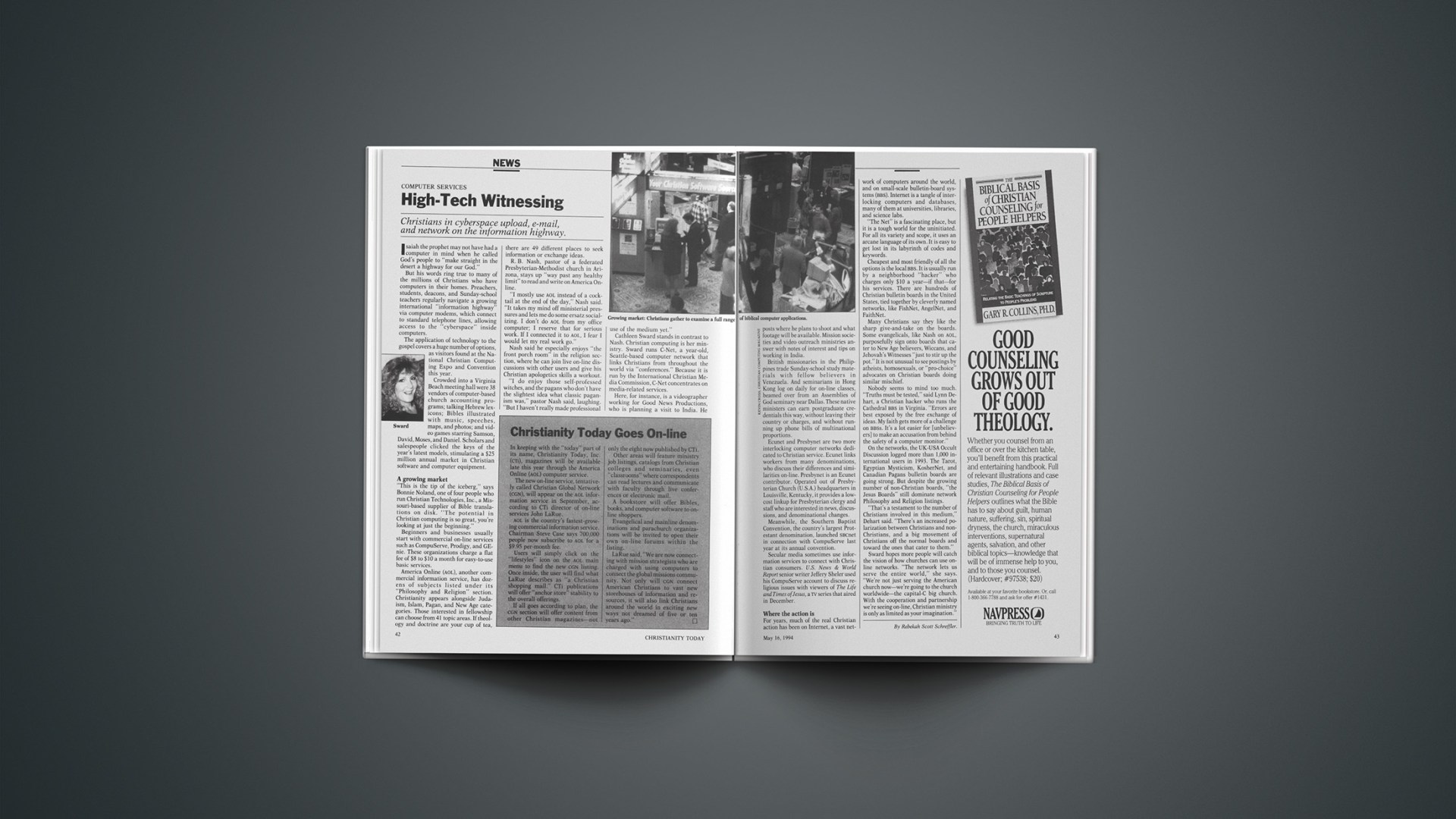Christians in cyberspace upload, e-mail, and network on the information highway.
Isaiah the prophet may not have had a computer in mind when he called God’s people to “make straight in the desert a highway for our God.”
But his words ring true to many of the millions of Christians who have computers in their homes. Preachers, students, deacons, and Sunday-school teachers regularly navigate a growing international “information highway” via computer moderns, which connect to standard telephone lines, allowing access to the “cyberspace” inside computers.
The application of technology to the gospel covers a huge number of options, as visitors found at the National Christian Computing Expo and Convention this year.
Crowded into a Virginia Beach meeting hall were 38 vendors of computer-based church accounting programs; talking Hebrew lexicons; Bibles illustrated with music, speeches, maps, and photos; and video games starring Samson, David, Moses, and Daniel. Scholars and salespeople clicked the keys of the year’s latest models, stimulating a $25 million annual market in Christian software and computer equipment.
A growing market
“This is the tip of the iceberg,” says Bonnie Noland, one of four people who run Christian Technologies, Inc., a Missouri-based supplier of Bible translations on disk. “The potential in Christian computing is so great, you’re looking at just the beginning.”
Beginners and businesses usually start with commercial on-line services such as CompuServe, Prodigy, and GEnie. These organizations charge a flat fee of $8 to $10 a month for easy-to-use basic services.
America Online (AOL), another commercial information service, has dozens of subjects listed under its “Philosophy and Religion” section. Christianity appears alongside Judaism, Islam, Pagan, and New Age categories. Those interested in fellowship can choose from 41 topic areas. If theology and doctrine are your cup of tea, there are 49 different places to seek information or exchange ideas.
R. B. Nash, pastor of a federated Presbyterian-Methodist church in Arizona, stays up “way past any healthy limit” to read and write on America Online.
“I mostly use AOL instead of a cocktail at the end of the day,” Nash said. “It takes my mind off ministerial pressures and lets me do some ersatz socializing. I don’t do AOL from my office computer; I reserve that for serious work. If I connected it to AOL, I fear I would let my real work go.”
Nash said he especially enjoys “the front porch room” in the religion section, where he can join live on-line discussions with other users and give his Christian apologetics skills a workout.
“I do enjoy those self-professed witches, and the pagans who don’t have the slightest idea what classic paganism was,” pastor Nash said, laughing. “But I haven’t really made professional use of the medium yet.”
Christianity Today Goes On-Line
In keeping with the “today” part of its name, Christianity Today, Inc. (CTi), magazines will be available late this year through the America Online (AOL) computer service.
The new on-line service, tentatively called Christian Global Network (CGN), will appear on the AOL information service in September, according to CTi director of on-line services John LaRue.
AOL is the country’s fastest-growing commercial information service. Chairman Steve Case says 700,000 people now subscribe to AOL for a $9.95 per-month fee.
Users will simply click on the “lifestyles” icon on the AOL main menu to find the new CGN listing. Once inside, the user will find what LaRue describes as “a Christian shopping mall.” CTi publications will offer “anchor store” stability to the overall offerings.
If all goes according to plan, the CGN section will offer content from other Christian magazines—not only the eight now published by CTi.
Other areas will feature ministry job listings, catalogs from Christian colleges and seminaries, even “classrooms” where correspondents can read lectures and communicate with faculty through live conferences or electronic mail.
A bookstore will offer Bibles, books, and computer software to online shoppers.
Evangelical and mainline denominations and parachurch organizations will be invited to open their own on-line forums within the listing.
LaRue said, “We are now connecting with mission strategists who are charged with using computers to connect the global missions community. Not only will CGN connect American Christians to vast new storehouses of information and resources, it will also link Christians around the world in exciting new ways not dreamed of five or ten years ago.”
Cathleen Sward stands in contrast to Nash. Christian computing is her ministry. Sward runs C-Net, a year-old, Seattle-based computer network that links Christians from throughout the world via “conferences.” Because it is run by the International Christian Media Commission, C-Net concentrates on media-related services.
Here, for instance, is a videographer working for Good News Productions, who is planning a visit to India. He posts where he plans to shoot and what footage will be available. Mission societies and video outreach ministries answer with notes of interest and tips on working in India.
British missionaries in the Philippines trade Sunday-school study materials with fellow believers in Venezuela. And seminarians in Hong Kong log on daily for on-line classes, beamed over from an Assemblies of God seminary near Dallas. These native ministers can earn postgraduate credentials this way, without leaving their country or charges, and without running up phone bills of multinational proportions.
Ecunet and Presbynet are two more interlocking computer networks dedicated to Christian service. Ecunet links workers from many denominations, who discuss their differences and similarities on-line. Presbynet is an Ecunet contributor. Operated out of Presbyterian Church (U.S.A.) headquarters in Louisville, Kentucky, it provides a low-cost linkup for Presbyterian clergy and staff who are interested in news, discussions, and denominational changes.
Meanwhile, the Southern Baptist Convention, the country’s largest Protestant denomination, launched SBCnet in connection with CompuServe last year at its annual convention.
Secular media sometimes use information services to connect with Christian consumers. U.S. News & World Report senior writer Jeffery Sheler used his CompuServe account to discuss religious issues with viewers of The Life and Times of Jesus, a TV series that aired in December.
Where the action is
For years, much of the real Christian action has been on Internet, a vast network of computers around the world, and on small-scale bulletin-board systems (BBS). Internet is a tangle of interlocking computers and databases, many of them at universities, libraries, and science labs.
“The Net” is a fascinating place, but it is a tough world for the uninitiated. For all its variety and scope, it uses an arcane language of its own. It is easy to get lost in its labyrinth of codes and keywords.
Cheapest and most friendly of all the options is the local BBS. It is usually run by a neighborhood “hacker” who charges only $10 a year—if that—for his services. There are hundreds of Christian bulletin boards in the United States, tied together by cleverly named networks, like FishNet, AngelNet, and FaithNet.
Many Christians say they like the sharp give-and-take on the boards. Some evangelicals, like Nash on AOL, purposefully sign onto boards that cater to New Age believers, Wiccans, and Jehovah’s Witnesses “just to stir up the pot.” It is not unusual to see postings by atheists, homosexuals, or “pro-choice” advocates on Christian boards doing similar mischief.
Nobody seems to mind too much. “Truths must be tested,” said Lynn Dehart, a Christian hacker who runs the Cathedral BBS in Virginia. “Errors are best exposed by the free exchange of ideas. My faith gets more of a challenge on BBSs. It’s a lot easier for [unbelievers] to make an accusation from behind the safety of a computer monitor.”
On the networks, the UK-USA Occult Discussion logged more than 1,000 international users in 1993. The Tarot, Egyptian Mysticism, KosherNet, and Canadian Pagans bulletin boards are going strong. But despite the growing number of non-Christian boards, “the Jesus Boards” still dominate network Philosophy and Religion listings.
“That’s a testament to the number of Christians involved in this medium,” Dehart said. “There’s an increased polarization between Christians and non-Christians, and a big movement of Christians off the normal boards and toward the ones that cater to them.”
Sward hopes more people will catch the vision of how churches can use online networks. “The network lets us serve the entire world,” she says. “We’re not just serving the American church now—we’re going to the church worldwide—the capital-C big church. With the cooperation and partnership we’re seeing on-line, Christian ministry is only as limited as your imagination.”
By Rebekah Scott Schreffler.










